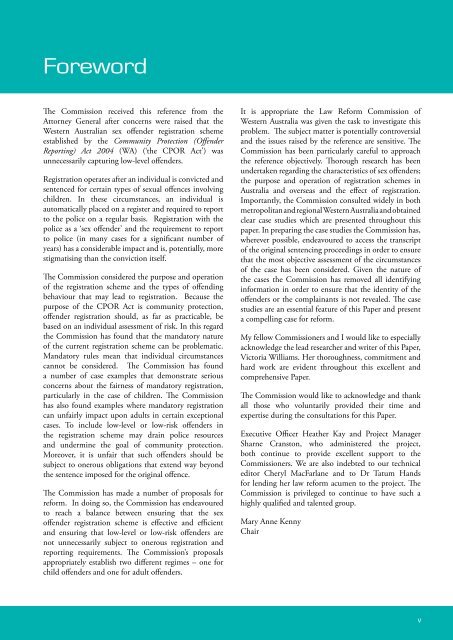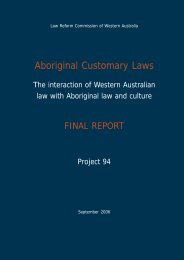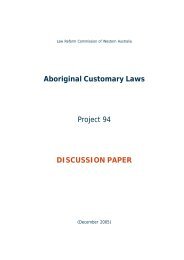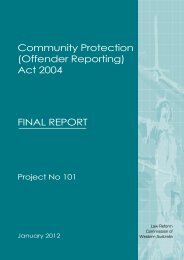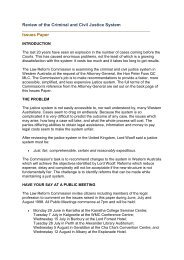Discussion Paper - Law Reform Commission of Western Australia
Discussion Paper - Law Reform Commission of Western Australia
Discussion Paper - Law Reform Commission of Western Australia
Create successful ePaper yourself
Turn your PDF publications into a flip-book with our unique Google optimized e-Paper software.
ForewordThe <strong>Commission</strong> received this reference from theAttorney General after concerns were raised that the<strong>Western</strong> <strong>Australia</strong>n sex <strong>of</strong>fender registration schemeestablished by the Community Protection (OffenderReporting) Act 2004 (WA) (‘the CPOR Act’) wasunnecessarily capturing low-level <strong>of</strong>fenders.Registration operates after an individual is convicted andsentenced for certain types <strong>of</strong> sexual <strong>of</strong>fences involvingchildren. In these circumstances, an individual isautomatically placed on a register and required to reportto the police on a regular basis. Registration with thepolice as a ‘sex <strong>of</strong>fender’ and the requirement to reportto police (in many cases for a significant number <strong>of</strong>years) has a considerable impact and is, potentially, morestigmatising than the conviction itself.The <strong>Commission</strong> considered the purpose and operation<strong>of</strong> the registration scheme and the types <strong>of</strong> <strong>of</strong>fendingbehaviour that may lead to registration. Because thepurpose <strong>of</strong> the CPOR Act is community protection,<strong>of</strong>fender registration should, as far as practicable, bebased on an individual assessment <strong>of</strong> risk. In this regardthe <strong>Commission</strong> has found that the mandatory nature<strong>of</strong> the current registration scheme can be problematic.Mandatory rules mean that individual circumstancescannot be considered. The <strong>Commission</strong> has founda number <strong>of</strong> case examples that demonstrate seriousconcerns about the fairness <strong>of</strong> mandatory registration,particularly in the case <strong>of</strong> children. The <strong>Commission</strong>has also found examples where mandatory registrationcan unfairly impact upon adults in certain exceptionalcases. To include low-level or low-risk <strong>of</strong>fenders inthe registration scheme may drain police resourcesand undermine the goal <strong>of</strong> community protection.Moreover, it is unfair that such <strong>of</strong>fenders should besubject to onerous obligations that extend way beyondthe sentence imposed for the original <strong>of</strong>fence.The <strong>Commission</strong> has made a number <strong>of</strong> proposals forreform. In doing so, the <strong>Commission</strong> has endeavouredto reach a balance between ensuring that the sex<strong>of</strong>fender registration scheme is effective and efficientand ensuring that low-level or low-risk <strong>of</strong>fenders arenot unnecessarily subject to onerous registration andreporting requirements. The <strong>Commission</strong>’s proposalsappropriately establish two different regimes – one forchild <strong>of</strong>fenders and one for adult <strong>of</strong>fenders.It is appropriate the <strong>Law</strong> <strong>Reform</strong> <strong>Commission</strong> <strong>of</strong><strong>Western</strong> <strong>Australia</strong> was given the task to investigate thisproblem. The subject matter is potentially controversialand the issues raised by the reference are sensitive. The<strong>Commission</strong> has been particularly careful to approachthe reference objectively. Thorough research has beenundertaken regarding the characteristics <strong>of</strong> sex <strong>of</strong>fenders;the purpose and operation <strong>of</strong> registration schemes in<strong>Australia</strong> and overseas and the effect <strong>of</strong> registration.Importantly, the <strong>Commission</strong> consulted widely in bothmetropolitan and regional <strong>Western</strong> <strong>Australia</strong> and obtainedclear case studies which are presented throughout thispaper. In preparing the case studies the <strong>Commission</strong> has,wherever possible, endeavoured to access the transcript<strong>of</strong> the original sentencing proceedings in order to ensurethat the most objective assessment <strong>of</strong> the circumstances<strong>of</strong> the case has been considered. Given the nature <strong>of</strong>the cases the <strong>Commission</strong> has removed all identifyinginformation in order to ensure that the identity <strong>of</strong> the<strong>of</strong>fenders or the complainants is not revealed. The casestudies are an essential feature <strong>of</strong> this <strong>Paper</strong> and presenta compelling case for reform.My fellow <strong>Commission</strong>ers and I would like to especiallyacknowledge the lead researcher and writer <strong>of</strong> this <strong>Paper</strong>,Victoria Williams. Her thoroughness, commitment andhard work are evident throughout this excellent andcomprehensive <strong>Paper</strong>.The <strong>Commission</strong> would like to acknowledge and thankall those who voluntarily provided their time andexpertise during the consultations for this <strong>Paper</strong>.Executive Officer Heather Kay and Project ManagerSharne Cranston, who administered the project,both continue to provide excellent support to the<strong>Commission</strong>ers. We are also indebted to our technicaleditor Cheryl MacFarlane and to Dr Tatum Handsfor lending her law reform acumen to the project. The<strong>Commission</strong> is privileged to continue to have such ahighly qualified and talented group.Mary Anne KennyChairv


